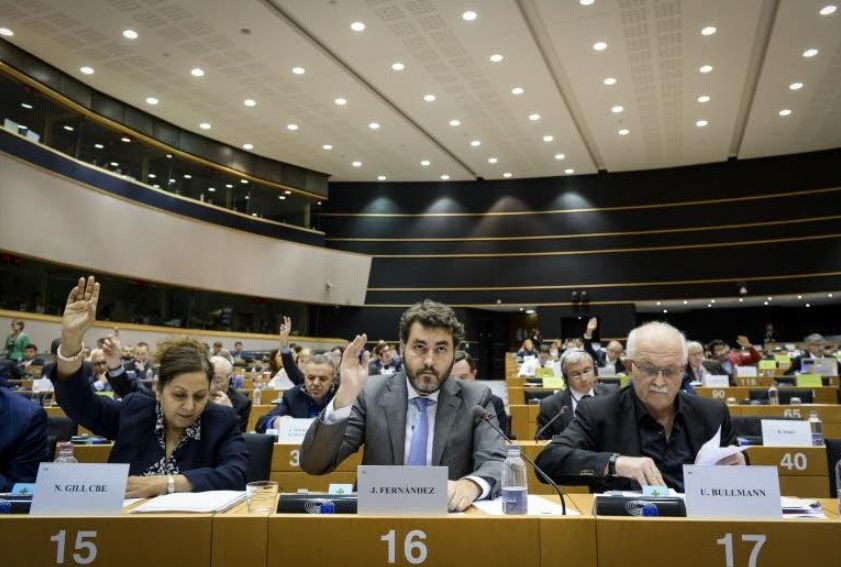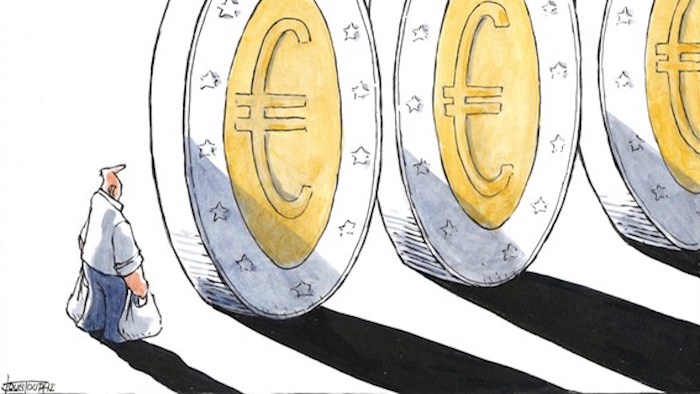The European Parliament passed a preliminary version of its annual report on the European Central Bank, which includes a number of criticisms and proposals that the QE for People campaign has been making. Continue reading “European Parliament report includes proposals from QE for People campaign”
Eurodividend project by UBIE
Europe needs bolder and stronger instruments to counter the forces of disintegration. The Eurodividend – a partial basic income paid to all Europeans – could become the policy instrument that safeguards the EU and especially the Eurozone from asymmetric economic shocks and reconciles citizens with the idea of European integration. Continue reading “Eurodividend project by UBIE”
How to set up a universal basic income for all Europeans
Belgian Economist François Denuit suggests introducing the euro-dividend as a new pillar of social rights on which member states could build up their own basic income policies. A big leap forward towards building a truly and ambitious Social Europe. Continue reading “How to set up a universal basic income for all Europeans”
European Minimum Income Network (EMIN)
The European Minimum Income Network (EMIN)[1] is an informal Network of organisations and individuals committed to achieve the progressive realisation of adequate, accessible and enabling Minimum Income Schemes. EMIN unites various experts, professionals, academics and diverse entities active in the fight against poverty and social exclusion. Continue reading “European Minimum Income Network (EMIN)”
Beyond Brexit: 3 Ways to Reboot Europe Now
Without changing the Treaties just yet, there are possible ways the EU could revive hope and support in the European integration. This requires the European Union to address the most urgent social and economic needs, relaunch citizens’ participation and prepare to fulfill its climate change commitments. Continue reading “Beyond Brexit: 3 Ways to Reboot Europe Now”
Can the ECB create money for a universal basic income?
Funding basic income through taxation is costly. At the same time, low consumer demand is a major worry. The European Central Bank could kill two birds with one stone by giving money directly to citizens.
Finnish social welfare agency KELA’s basic income experiment has got plenty of attention in Finland and elsewhere. This is not surprising: in recent years various proposals for a basic income have been submitted by a growing number of scientists, politicians and non-governmental organizations in several countries. Continue reading “Can the ECB create money for a universal basic income?”
Eurodividend: A partial basic income paid to all Europeans
Europe is in deep trouble – economically, socially, and politically. We need new, bolder and stronger instruments to counter the forces of disintegration. A partial basic income paid to all Europeans – a Eurodividend – could become the policy instrument that safeguards the EU and especially the Eurozone from asymetric economic shocks and reconciles citizens with the idea of European integration.
Today, the risk of poverty and social exclusion levels in the EU and in particular the precarity of young people, child poverty and in-work poverty are extremely worrying whilst the prospects of the EU’s 2020 poverty target (i.e. to lift 20 million people out of poverty by 2020) look rather dim. Moreover, unemployment levels remain very high and particularly affect young people whereas the technological and digital revolution is affecting employment in various aspects, through the replacement of a great amount of jobs, the reorganisation of the workplace and the increase of the gap between productivity gains and income earned by workers. Finally, in the Eurozone, the introduction of the euro has produced increasing economic divergence between deficit and surplus countries (in terms of GDP per capita, labour productivity or unemployment levels among others) as well as important social imbalances in terms of public investment in education, healthcare, or social security. Continue reading “Eurodividend: A partial basic income paid to all Europeans”
ECB should design, decide and implement the helicopter money programme
Instead of injecting the equivalent of €2.2 trillion into financial markets, the ECB could have injected a quarter as much money and distributed €1,000 to all adult citizens in the eurozone.
The European Conservatives and Reformists (ECR) group in the European Parliament recently launched “Leer Geld”, an initiative led by MEP Sander Loones, to raise awareness about the effects of the monetary policy conducted by the European Central Bank (ECB).
The initiative is to be welcomed: monetary policy is too often overlooked by civil society, yet its impact on our lives has never been greater. Under its “quantitative easing” programme (QE), the ECB has been buying large quantities of government bonds since 2015. Surely injecting the equivalent of 20 percent of GDP into the eurozone finance sector cannot be without consequences. Continue reading “ECB should design, decide and implement the helicopter money programme”
QE for People’s 10 steps forward in 2016
2016 was marked with a series of successes in challenging the ECB’s strategy and bringing the discussion on monetary policy forward. Please find below 10 of the achievements we are most proud of. Continue reading “QE for People’s 10 steps forward in 2016”
ECB confirms ‘Helicopter Money’ is Legally Feasible under Conditions
Mario Draghi first discussed the notion of ‘helicopter money’ in March 2016, saying “it is an interesting concept.” Since then however, the head of the European Central Bank repeatedly stated that the idea that central banks could distribute money directly to citizens, was fraught with accounting-wise, technical and legal complexity.” However the ECB had declined at several occasion to specify in detail which were the foreseen legal obstacles.
In a letter dated 29 November to Spanish MEP Jonas Fernandez, the ECB finally provides clarifications. And our interpretation of the letter lead to the conclusion that those legal issues are very weak and solvable.
The QE for People campaign praises the ECB for finally providing this legal clarification. “By providing a detailed answer on this point, the ECB acknowledges its understanding of our proposal, which many economists say could bring significant benefits to the economy” said Stan Jourdan, QE for People campaign coordinator.
Helicopter money must be designed as monetary policy
Continue reading “ECB confirms ‘Helicopter Money’ is Legally Feasible under Conditions”











